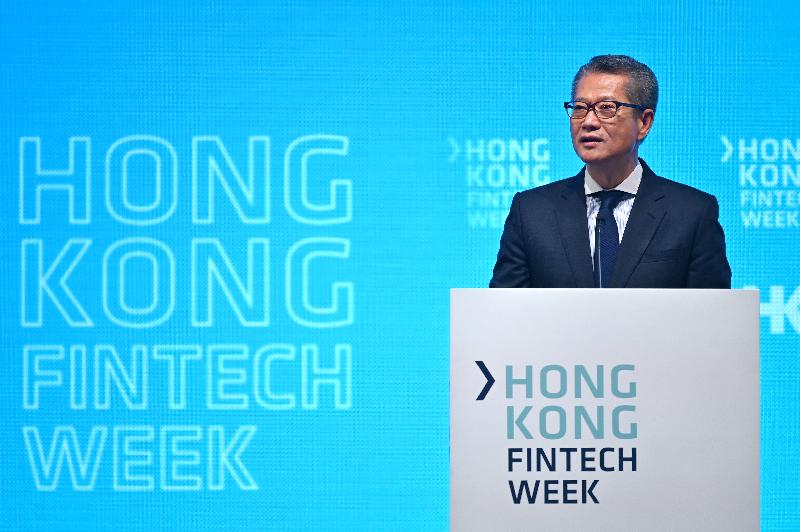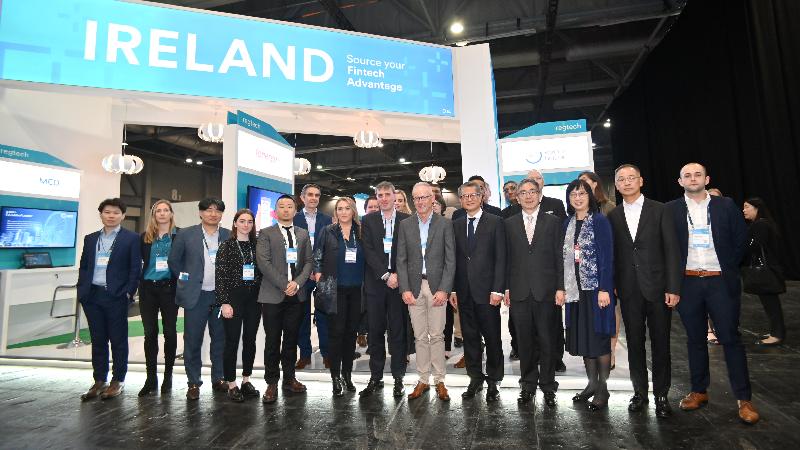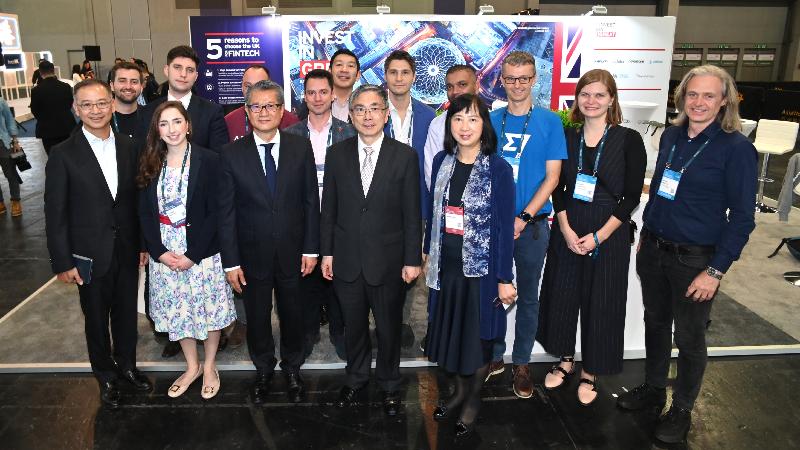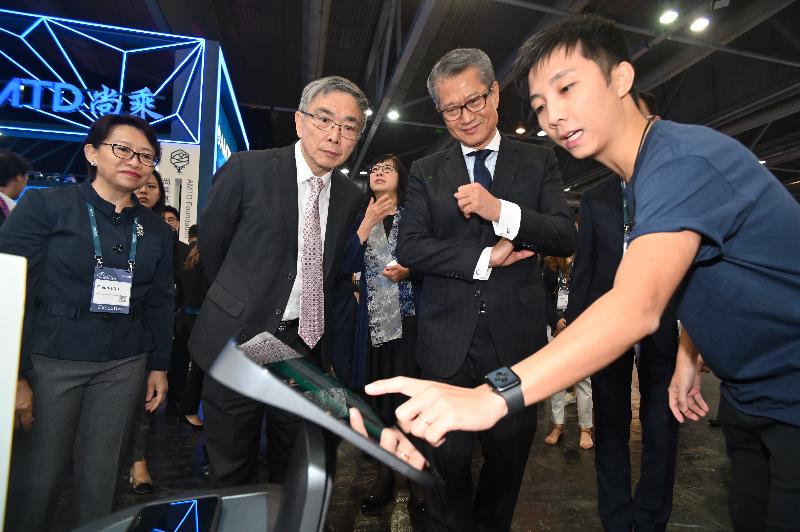Following is the speech by the Financial Secretary, Mr Paul Chan, at the opening of Hong Kong Fintech Week 2019 this morning (November 6):
Eddie (Chief Executive of the Hong Kong Monetary Authority (HKMA), Mr Eddie Yue), distinguished guests, government colleagues, ladies and gentlemen,
Good morning.
I'm pleased to welcome you to the fourth annual Hong Kong Fintech Week. I'm told you're here, in the thousands, from more than 60 countries and regions. I'm told you're financial technology leaders and entrepreneurs, investors, regulators, academics and so many others who have seen the future of banking and know that it will be built on technology.
Wherever you may be, whatever your financial focus, Hong Kong Fintech Week can help you find your way. This year's expanded Fintech Week features 10 international delegations, 200 expert speakers, more than a hundred exhibitors and a wealth of industry seminars and networking events.
And Hong Kong can help you find your fintech future because we're building that future right now.
The present, as you know, is in considerable flux here. But we are working to heal our community divide, communicating to find a way forward, to return harmony to Hong Kong. It is a work in progress but, in good time, we will get there.
In the meantime, the faltering global economy and Hong Kong's continuing community dissension have brought us a heavy hit. They've dealt a blow to our economic growth and to a great many businesses across sectors.
Despite today's very real business challenges, I'm here to tell you that Hong Kong remains one of the world's most competitive economies. Last month, the World Economic Forum's Global Competitiveness Report ranked Hong Kong third – up from seventh last year. And, in terms of digital competitiveness, the Swiss-based International Institute for Management Development ranked Hong Kong eighth, up from 11th last year, with a big leap forward in the factor "Future readiness". And earlier this year, the same Institute also placed Hong Kong second in the World Competitiveness Yearbook.
Indeed, our banks and financial markets continue to operate smoothly.
And we remain strongly committed to the Linked Exchange Rate System, which has served Hong Kong well for 36 years, through countless economic and financial cycles.
Hong Kong's foreign exchange reserves stand at US$430 billion, more than two times of our monetary base.
No less important, the free flow of capital, in and out of Hong Kong, is guaranteed under the Basic Law. It's also driven by Hong Kong's status as one of the world's leading financial centres – and China's international financial capital.
It's not surprising that Hong Kong's fintech sector is fast emerging as a regional hub.
World-renowned innovation laboratories and accelerator programmes, such as Accenture Fintech Innovation Lab and Deloitte Asia Pacific Blockchain Lab, have established their presence here.
According to Accenture, Hong Kong fintech companies have raised US$1.1 billion over the past five years.
The number of Fintech companies based here now exceeds 600. About 40 per cent of them were started overseas, choosing turning to Hong Kong as their base in the Asian region.
Many of them see Hong Kong as their business bridge to the region and, in particular, to the Mainland. Indeed, more than 50 per cent of our fintech companies either operated in the Guangdong-Hong Kong-Macao Greater Bay Area or plan to expand their business into the region.
More than a gateway to the region, Hong Kong is at the heart of fintech innovation in Asia.
Earlier this year, the Hong Kong Monetary Authority awarded licences to our first eight virtual banks. We hope to see the launch of some of them by the end of the year. And you will hear more about our virtual banks in various sessions today and tomorrow.
Earlier this year, the HKMA also launched phase one of the Open Application Programming Interface (API) framework, allowing technology companies to create fintech-enabled solutions for the banking industry.
Today, more than 500 open APIs have been launched by some 20 retail banks. Phase two, which began last month, focuses on customer acquisition. The two phases, covering account information and transactions, are now being developed by the HKMA in close collaboration with the industry.
These new initiatives are game-changers for the banking sector and Hong Kong's financial services sector as a whole.
In September last year, we launched the Faster Payment System, which connects banks and stored-value facilities, or "e-wallets", enabling instant fund transfer – seven days a week, 24 hours a day – in both Hong Kong dollar and Renminbi.
As of September, the Faster Payment System had recorded about 3.5 million registrations. In the month of September alone, the System processed about four million transactions involving HK$58 billion and RMB 1 billion.
At the same time, we introduced the common QR code standard for retail payments. It helps merchants, especially SMEs, use a single QR code to accept payments by various schemes.
Last year, our Insurance Authority began its Fast Track scheme, which expedites applications to engage in the insurance business, in or from Hong Kong, solely using digital distribution channels.
The first virtual insurer under Fast Track was granted last December. A second authorisation was approved just last month, creating more customer-centric services and products.
As for our securities, my colleague Ashley, the CEO of the Securities and Futures Commission, will make a major announcement on virtual assets this afternoon. So stay tuned.
Ultimately, of course, fintech rises on the human talent behind the technology.
It's one of the reasons why the HKMA established the Academy of Finance in June. The Academy serves as a centre of excellence in the development of tomorrow's financial leaders.
And, starting early next year, our Cyberport will launch a fintech training programme for in-service financial professionals, helping professionals from our traditional financial sector embrace the promise of fintech.
There's lots more in the fintech pipeline, but allow me, for just a moment, to touch on Shenzhen, your host for Fintech's final day, this Friday.
Hong Kong and Shenzhen are two of the 11 cities in the Greater Bay Area. Together, we will help drive innovation and technology for this fast-emerging cluster city development of 71 million consumers.
The Greater Bay Area is an enormous market, an outsized opportunity for fintech and investment in fintech. I know you will make the most out of your high-tech day in Shenzhen, and this event-packed week of financial technology and networking here in Hong Kong.
Allow me to congratulate the finalists of the inaugural FintechHK Global Competition, a highlight of this year's Fintech Week.
My sincere thanks to the Invest Hong Kong, the presenter of Fintech Week. I am grateful, as well, to our regulators including the Hong Kong Monetary Authority, the Securities and Futures Commission and the Insurance Authority for their invaluable support of Fintech Week and certainly Hong Kong's fintech future.
Ladies and gentlemen, I wish you a rewarding time in Hong Kong. And I wish you the best of fintech business in the coming year.
Thank you very much indeed.
Follow this news feed: East Asia









